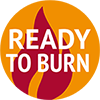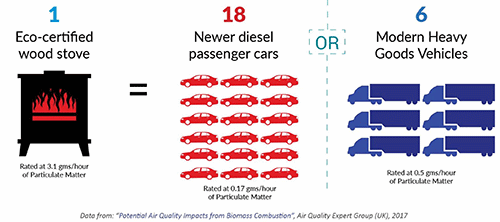Smoke control areas: permitted appliances and fuels
Environmental Health Team is responsible for controlling smoke and bonfires to improve air quality in the borough.
Smoke control
We discourage all forms of burning as it causes air pollution, can upset neighbours and can damage health (particularly of children, older people, and those with breathing and heart conditions).
Burning wood and coal at home emits dangerous pollution known as fine particulate matter (often referred to as PM2.5), which is a known carcinogen and can cause asthma, heart disease and other serious illnesses affecting our lungs, hearts and brains. Exposure to particulate air pollution can also trigger the symptoms of existing health conditions.
Current evidence suggests there is no safe level of PM2.5, and both short-term and long-term exposure to PM2.5 increases the risk of early deaths from respiratory and cardiovascular diseases.
A study found wood burning accounts for between 23 and 31 per cent of urban derived PM2.5 in London, which is why controlling wood burning is an important urban issue. Biomass wood burning is the second largest source of PM2.5 in London after road transport. See Airborne particles from wood burning in UK cities KLC
Smoke Control Areas
On 1 November 2012 the borough's Smoke Control Order came into effect. A smoke control area is a legally defined area where you cannot release smoke from a chimney.
The whole of Wandsworth is a smoke control area where people and businesses must use an exempt appliance and/or authorised fuel. For example, you could have an exempt wood burner burning non-authorised fuel, such as untreated wood; or an open fire burning an authorised dry, smokeless fuel.
Once a fire is established there should be hardly any smoke visible, and certainly no grey or dark smoke. Dry storage of fuel is very important because burning damp fuel may produce smoke.
The government has produced an information guide to help you get the most from your fire and fuel, which provides further advice on the procedures to follow when lighting a fire so as to minimise smoke emissions.
Authorised fuel
From May 2021, it became an offence to sell, rather than to burn, unauthorised fuel under the Air Quality (Domestic Solid Fuels Standards) (England) Regulations 2020.
You could be fined up to £1,000 if you sell unauthorised fuel to customers using 'non-exempt appliances' in smoke control areas.
If purchasing solid fuel, ensure that it is certified as Ready to Burn. The Ready to Burn mark on packaging identifies solid fuels that are legal to burn at home in compliance with the Air Quality Regulations 2020.

Multi-fuel stoves and wood burners
From January 2022, all new wood burning and multi-fuel stoves have to adhere to strict new regulations known as Ecodesign. Compliant appliances will have this logo:

This is an efficiency accreditation scheme where wood burners and stoves pass rigorous tests to determine their emission and efficiency outputs. Appliances are given a rating from 1 to 5 based on their emissions and efficiency. For anyone planning to install, replace or retrofit a wood burner in this borough, we encourage you to choose appliances with a rating of 4 or 5. From 2022 the minimum rating allowed in smoke control areas is now Level 3.
Note that older appliances approved before 2010 may be considerably less efficient and more polluting than newer models.
Indoor burning
Fires in your home are not a cost-effective way to heat your house and negatively impact local air quality. We discourage the burning of wood and coal unless you have no alternative source of heating as it causes air pollution, can upset neighbours and damages health.
You can get advice on energy efficiency and ways to save money on heating and insulation from the Cost of Living Hub, and from other organisations including the Energy Saving Trust.
Even if you are using exempt appliances and authorised fuels, they still have a negative impact on air quality and public health and will produce indoor air pollution inside your home.
A recent study of indoor air quality in homes with Defra-exempt stoves found that indoor PM2.5 levels were three times higher on days when stoves were used compared to non-use days.
The hourly PM2.5 emissions (in grams per hour (g/h)) from 1 eco-certified wood burning stove (3.1 g/h) is equal to 18 newer diesel passenger cars (each rated at 0.17 g/h) or 6 modern heavy goods vehicles (each rated at 0.5 g/h).

Data from Potential Air Quality Impacts from Biomass Combustion, Air Quality Expert Group (UK), 2017.
London Wood Burning Project
We are a member of the London Wood Burning Project. The project aims to protect the health of people living, working, and learning in London by raising awareness, and improving understanding of the environmental and human health impacts from domestic wood and other solid fuel burning.
View the project's leaflet outlining the rules around burning wood and solid fuel.
For further information visit the London Wood Burning Project website.
Enforcement
Please be aware when smoke is emitted from a chimney in a smoke control area, the local authority has the powers to investigate. If sufficient evidence is obtained a financial penalty can be issued to the person responsible such as the occupier of the building with the chimney, for example, the homeowner or the tenant.
Department for Environment, Food & Rural Affairs' (DEFRA) have produced a practical guide to smoke control areas covering the above topics.
Report chimney smoke
To report chimney smoke please email the Pollution Team at pollution@merton.gov.uk. Your report must include the address where the chimney is located to enable investigation.
Bonfires
We strongly encourage you not to have bonfires because smoke from bonfires is harmful to health, especially for people with breathing difficulties. You are encouraged to use our green waste collection service or compost your garden waste at home.
Commercial bonfires
Commercial waste must not be disposed of by burning. Contractors carrying out work at your property must not use bonfires to burn waste and you must ensure that they arrange for proper disposal of waste from your property.
Domestic bonfires
Smoke control legislation does not apply to garden bonfires. We do however try to discourage people from having garden bonfires which can cause serious nuisance to neighbouring properties.
Report a problem
You can report a bonfire problem via a form on our website where you can also read our statutory nuisance guidance.
If smoke from a bonfire is causing a danger to traffic contact the police. If you feel that the bonfire is a danger to people and property you should call the fire brigade. The emergency services number is 999.